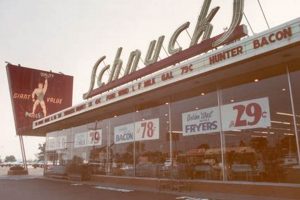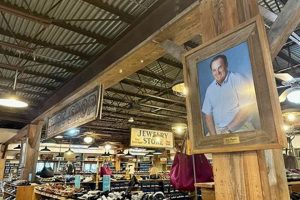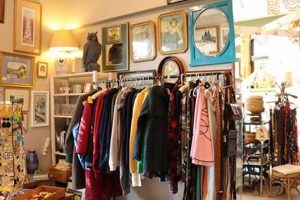Establishments specializing in the sale of pre-owned merchandise, specifically clothing, accessories, and home goods from past eras, are located within the Knoxville, Tennessee metropolitan area. These businesses curate collections representing various decades, offering consumers an alternative to contemporary retail outlets. The array of goods available may include items ranging from mid-century modern furniture to clothing styles popularized in the 1970s and 1980s.
The appeal of such establishments lies in several factors. They provide access to unique and often one-of-a-kind items unavailable in mass-market stores. The acquisition of pre-owned goods promotes sustainability by extending the life cycle of products and reducing reliance on new manufacturing processes. Further, these stores contribute to local economies and often foster a sense of community among collectors, fashion enthusiasts, and individuals interested in historical artifacts. The historical context embedded in the merchandise offers a tangible connection to the past.
Subsequent sections will delve into specific types of merchandise found within these Knoxville retailers, methods for evaluating the authenticity and condition of vintage goods, and strategies for locating and navigating these unique shopping destinations.
Successful acquisition of authentic and desirable items from establishments selling pre-owned merchandise requires informed decision-making and a strategic approach. The following tips aim to equip the prospective buyer with the knowledge necessary to navigate the vintage marketplace effectively.
Tip 1: Research Prior to Visiting. Before venturing into specific stores, conduct preliminary research regarding the establishment’s specialization. Some retailers may focus primarily on clothing, while others emphasize furniture or decorative arts. Identify stores aligning with particular interests.
Tip 2: Assess Garment Construction. Examine the quality of stitching, seam finishes, and overall construction. Well-made garments from previous eras often exhibit superior craftsmanship compared to contemporary mass-produced items. Search for details such as hand-stitched hems or meticulously aligned patterns.
Tip 3: Inspect for Damage. Thoroughly examine items for signs of wear, including stains, tears, fading, or missing components. While minor imperfections may be acceptable, consider the cost and feasibility of restoration or repair.
Tip 4: Verify Authenticity. When purchasing items purported to be from a specific designer or era, scrutinize labels and markings. Research known characteristics of authentic pieces from the period in question to mitigate the risk of acquiring counterfeit items.
Tip 5: Consider Alterations. Vintage garments may not conform to contemporary sizing standards. Evaluate the potential for alterations to achieve a proper fit. Factor alteration costs into the overall purchase decision.
Tip 6: Negotiate Prices. Many establishments selling pre-owned merchandise are open to negotiation, particularly for items with minor imperfections or those that have been on the sales floor for an extended period. Approach negotiation respectfully and with clear justification.
Tip 7: Understand Return Policies. Clarify the store’s return or exchange policy before making a purchase. Vintage items are often sold “as is,” and returns may not be permitted. Inquire about recourse options in cases of undisclosed damage or misrepresentation.
By applying these strategies, individuals can increase their chances of acquiring valuable and authentic pieces while minimizing the risk of disappointment or financial loss. The vintage marketplace offers unique opportunities for discerning shoppers.
The subsequent section will cover the impact of the second-hand marketplace on sustainability and the Knoxville economy.
1. Antiques
The presence of antiques within Knoxville establishments offering pre-owned merchandise represents a distinct segment of the market, characterized by items of significant age and perceived historical value. This intersection of antiques with the broader category of “vintage” enriches the consumer experience and necessitates specialized knowledge for both buyers and sellers.
- Defining Antiquity
Antiques are generally defined as items at least 100 years old, distinguishing them from more recent “vintage” items. This age threshold often implies a higher level of rarity and historical significance. Within Knoxville stores, genuine antiques command premium prices due to their scarcity and provenance. However, sellers should correctly categorize to avoid misrepresenting items.
- Valuation and Authentication
Assessing the value of antique items requires expertise in areas such as provenance research, condition assessment, and market analysis. Antique dealers often consult with appraisers and utilize specialized databases to determine fair market value. Verification of authenticity is paramount to ensure accurate pricing and prevent the sale of reproductions or forgeries.
- Preservation and Restoration
Antique items, by virtue of their age, are often subject to deterioration and damage. Proper preservation and, when necessary, restoration are crucial to maintaining their value and historical integrity. Conservation techniques should prioritize minimal intervention and the use of archival-quality materials. Knoxville-area specialists offer expertise in antique restoration.
- Consumer Interest and Trends
Consumer interest in antiques fluctuates based on various factors, including economic conditions, design trends, and media portrayals. Certain periods and styles, such as Victorian furniture or Art Deco accessories, may experience increased demand. Knoxville stores must adapt their inventory and marketing strategies to cater to evolving consumer preferences.
The antique component of the Knoxville pre-owned merchandise market presents both opportunities and challenges. For consumers, it offers access to unique and historically significant items. For sellers, it requires specialized knowledge and ethical practices to ensure accurate valuation and prevent misrepresentation. The enduring appeal of antiques ensures their continued presence within the broader landscape of pre-owned goods.
2. Clothing
Clothing constitutes a fundamental component of establishments selling pre-owned merchandise in Knoxville, Tennessee. The availability of vintage clothing is a primary driver for consumer interest in these retail locations. These garments represent specific eras and styles, providing customers with options unavailable in conventional retail settings. Their presence directly impacts the store’s appeal, traffic, and overall revenue. Specific examples include stores specializing in 1950s dresses or 1970s denim, demonstrating how focused inventories of clothing attract niche markets and generate dedicated customer bases.
The condition and authenticity of clothing offerings are crucial factors influencing purchasing decisions. Establishments that carefully curate and preserve their clothing stock, ensuring items are clean, repaired when necessary, and accurately dated, often experience higher levels of customer trust and repeat business. Conversely, stores with poorly maintained or inaccurately represented clothing risk damaging their reputation and losing customer loyalty. A practical understanding of textile history, garment construction, and period-specific design elements becomes essential for staff to effectively evaluate and present clothing items to prospective buyers.
Ultimately, clothing defines the product selection of vintage stores in Knoxville. Success relies on knowledgeable curation, meticulous preservation, and a keen awareness of customer expectations. The effective management and presentation of pre-owned apparel directly correlates with the viability and reputation of these businesses, underscoring clothing’s integral role in the vintage retail landscape.
3. Furniture
Furniture represents a significant category within the inventories of establishments specializing in pre-owned merchandise within Knoxville, Tennessee. The appeal of vintage furniture lies in its unique design, craftsmanship, and historical value, attracting consumers seeking alternatives to contemporary mass-produced items.
- Mid-Century Modern Design
The mid-century modern aesthetic, characterized by clean lines, organic shapes, and functional design, is particularly prevalent in Knoxville’s vintage furniture market. Examples include iconic pieces from designers such as Eames, Knoll, and Herman Miller. The popularity of this style stems from its timeless appeal and adaptability to various interior design schemes.
- Antique and Period Pieces
Furniture from earlier periods, such as Victorian, Art Deco, and Arts & Crafts, also feature prominently in some Knoxville stores. These pieces often exhibit intricate detailing, handcrafted elements, and valuable materials. The acquisition of antique furniture allows consumers to incorporate historical artifacts into their living spaces.
- Condition and Restoration
The condition of vintage furniture is a critical factor influencing its value and desirability. Establishments selling pre-owned furniture often offer restoration services to repair damage, refinish surfaces, and reupholster pieces. Consumers should carefully inspect furniture for structural integrity, cosmetic flaws, and evidence of past repairs.
- Sourcing and Inventory Management
Establishments selling vintage furniture employ various methods for sourcing their inventory, including estate sales, auctions, and private acquisitions. Effective inventory management is essential to ensure a diverse selection of furniture styles and price points. Stores must balance the acquisition of desirable items with the logistical challenges of storage and transportation.
The presence of vintage furniture within Knoxville stores contributes to the city’s distinctive retail landscape and provides consumers with access to unique and sustainable home furnishings. The careful curation, restoration, and marketing of vintage furniture are essential for the success of these businesses.
4. Collectibles
The inclusion of collectibles within Knoxville’s establishments specializing in pre-owned merchandise significantly shapes their identity and appeal. Collectibles, encompassing a wide array of items from vintage toys to rare books and memorabilia, function as a powerful draw, attracting a specific clientele with particular interests and purchasing habits. The presence of these items contributes to the overall atmosphere and perceived value of these stores, differentiating them from standard retail outlets. Stores focusing on collectibles also contribute to tourism, as people from other areas seek out collectibles.
The proper identification, valuation, and display of collectibles are critical to their successful integration into the vintage store environment. Accurate assessment of an item’s condition, rarity, and historical significance directly impacts its market value. Store owners must possess specialized knowledge or consult with experts to avoid mispricing or misrepresentation, which can erode customer trust. Further, the manner in which collectibles are presented, whether in carefully curated displays or organized inventories, influences their appeal and potential for sale. The rise of online auction sites and specialized collectible marketplaces also affects pricing and buyer expectations within the local market, requiring store owners to remain competitive and informed.
In conclusion, collectibles represent an essential component of the vintage retail landscape in Knoxville, TN. Their successful integration requires a combination of specialized knowledge, careful curation, and a deep understanding of market trends and consumer preferences. Properly managed, collectibles can significantly enhance a store’s appeal and contribute to its long-term viability. This also has a positive impact on local tourism and Knoxville’s economy. The challenge lies in maintaining authenticity, providing accurate valuation, and meeting the evolving demands of discerning collectors, to solidify these establishments’ position as key destinations for those seeking unique and historically significant items.
5. Local Economy
The presence of establishments specializing in pre-owned merchandise directly influences the economic ecosystem of Knoxville, Tennessee. These businesses contribute to the local economy through various mechanisms, creating jobs, generating revenue, and attracting both residents and tourists.
- Job Creation and Employment
Vintage stores, antique shops, and consignment boutiques provide employment opportunities for individuals with skills in retail sales, inventory management, restoration, and appraisal. These jobs contribute to the overall employment rate within Knoxville and offer potential career paths for those interested in the field of pre-owned merchandise. The number of employees is in direct proportion to the size of each business.
- Tax Revenue Generation
Sales generated by establishments selling pre-owned merchandise contribute to local and state tax revenues. These funds support public services, infrastructure development, and community programs within Knoxville. The sales tax collection varies with the season and the popularity of each business.
- Tourism and Destination Appeal
The existence of unique and well-curated vintage stores can enhance Knoxville’s appeal as a tourist destination. Visitors interested in antiques, vintage clothing, or collectibles may travel to Knoxville specifically to explore these establishments, generating revenue for local hotels, restaurants, and other businesses. Some travelers may find that the vintage shopping available is so good, it makes them want to move to Knoxville permanently.
- Support for Local Artisans and Craftspeople
Some vintage stores incorporate locally made or upcycled goods into their inventory, providing a platform for local artisans and craftspeople to reach a wider audience. This symbiotic relationship fosters creativity, supports small businesses, and contributes to the unique character of Knoxville’s retail environment. These collaborations promote local craftspeople to the public, leading to an increase in revenue and local pride.
In summation, the presence of establishments offering pre-owned merchandise has a multifaceted and positive impact on Knoxville’s local economy. These businesses create jobs, generate revenue, attract tourists, and support local artisans, contributing to the city’s economic vitality and cultural distinctiveness. This relationship strengthens the local economy and contributes to Knoxville’s identity.
6. Sustainability
The operation of establishments specializing in pre-owned merchandise within Knoxville, Tennessee, aligns with principles of environmental sustainability by mitigating waste and promoting resource conservation. These enterprises offer an alternative to the linear “take-make-dispose” model prevalent in contemporary consumer culture.
- Reduced Landfill Waste
The acquisition and resale of pre-owned items directly reduces the volume of textiles, furniture, and other goods entering landfills. This reduction alleviates the environmental burden associated with waste disposal, including soil and water contamination, and the release of greenhouse gasses. By extending the lifecycle of items, these stores actively participate in waste minimization. Example of items that are not in the landfill are clothing and furniture.
- Conservation of Resources
Producing new goods requires the extraction of raw materials, energy consumption, and water usage. By promoting the reuse of existing items, establishments selling pre-owned merchandise minimize the demand for new production, thereby conserving natural resources. This practice lowers the environmental impact associated with manufacturing processes. Example items that conserve resources are the selling of antiques.
- Decreased Carbon Footprint
The manufacturing and transportation of new goods contribute significantly to carbon emissions. By diverting items from landfills and reducing the demand for new production, vintage stores indirectly decrease the overall carbon footprint associated with consumerism. This reduction contributes to broader efforts to mitigate climate change. The vintage stores minimize traveling and shipment of brand new items.
- Promotion of Circular Economy
Establishments selling pre-owned merchandise exemplify the principles of a circular economy, where resources are kept in use for as long as possible, minimizing waste and pollution. This model promotes sustainable consumption patterns and reduces reliance on finite resources. The vintage stores provide economic stimulus and provide a second life to items in the marketplace.
The sustainable practices inherent in the operation of Knoxville’s pre-owned merchandise establishments contribute to a more environmentally responsible consumer culture. These businesses serve as an alternative to conventional retail models, promoting waste reduction, resource conservation, and a more circular approach to consumption. The continued growth and support of these establishments can play a significant role in advancing sustainability within the local community.
Frequently Asked Questions
This section addresses common inquiries regarding establishments specializing in pre-owned merchandise within the Knoxville, Tennessee area. The following information aims to provide clarity and facilitate informed decision-making.
Question 1: What constitutes “vintage” versus “antique” in the context of Knoxville stores?
The term “vintage” generally applies to items at least 20 years old, reflecting a specific era or style. “Antique” typically denotes items exceeding 100 years in age, possessing significant historical value. Knoxville stores may carry items falling into both categories, though some may specialize in one or the other.
Question 2: How can one assess the authenticity of vintage clothing found in Knoxville establishments?
Authenticity verification involves examining garment construction, labels, and design details. Researching known characteristics of specific eras and designers is crucial. Consultation with knowledgeable store staff or external appraisers may be necessary for high-value items. Close examination is encouraged.
Question 3: What factors influence the pricing of pre-owned furniture in Knoxville vintage stores?
Pricing is determined by factors such as age, condition, design, provenance, and market demand. Iconic mid-century modern pieces or well-preserved antiques command higher prices. Restoration costs and rarity also play a significant role.
Question 4: What are the typical return policies for vintage items purchased in Knoxville?
Return policies vary among establishments. Due to the unique and often irreplaceable nature of vintage items, “as-is” sales are common. Prospective buyers are advised to inquire about return options before making a purchase. Obtaining a written confirmation of the return policy is recommended.
Question 5: How does purchasing from Knoxville vintage stores contribute to sustainability efforts?
Acquiring pre-owned merchandise reduces landfill waste, conserves natural resources, and lowers the carbon footprint associated with new production. These actions support a circular economy and promote environmentally responsible consumerism.
Question 6: Are there specialized vintage stores in Knoxville focusing on specific eras or types of merchandise?
Yes, Knoxville features a variety of vintage stores with niche specializations. Some focus on clothing from particular decades, while others emphasize furniture, collectibles, or antiques. Preliminary research is advised to identify stores aligning with individual interests.
The information provided above offers a foundational understanding of key aspects relating to Knoxville’s vintage retail sector. Prudent investigation and careful consideration are essential for a successful shopping experience.
The subsequent section will provide a directory of notable vintage stores located in Knoxville, TN.
vintage stores knoxville tn
The preceding exploration of establishments offering pre-owned merchandise within Knoxville, Tennessee, has illuminated key aspects of this retail sector. Examination of antiques, clothing, furniture, collectibles, and the associated impacts on the local economy and sustainability demonstrates the multifaceted nature of these businesses. A comprehensive understanding of these elements is crucial for both consumers and stakeholders involved in the vintage marketplace.
Continued support and engagement with these establishments are essential for preserving Knoxville’s unique retail landscape and promoting sustainable consumption practices. Further research and community involvement will strengthen the vitality of this sector and contribute to the city’s economic and cultural growth.







